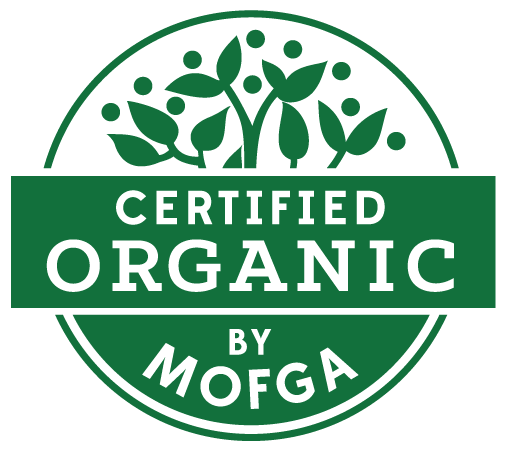MOFGA has been certifying organic farms for 50 years! It’s time to look back at the history of certification through MOFGA and MOFGA Certification Services (MCS).

In 1972, MOFGA started the first organic certification program in the country. Most of those early growers had started by producing food for themselves as part of the back-to-the-land movement and when they produced more food than they needed they sold the excess at farm stands, and to neighbors and stores.
As this movement was happening in the United States, organic farming was taking hold even faster in Europe, where the International Federation of Organic Agriculture Movements (IFOAM) developed a standard defining organic production. These standards were printed by the Rodale Press in its Organic Gardening magazine, where U.S. farmers saw them, and in 1972 MOFGA started the first organic certification program in the country, based on these IFOAM standards. That year, MOFGA certified 27 farms as organic, starting with Ken and Roberta Horn’s 140-acre Ken-Ro Farm in Plymouth. In those early days, volunteer committees made up of experienced growers worked on organic standards and met to discuss applications and grant certification as appropriate.
During that time several other states developed their own organic certification rules and oversight methods, with other states having no organic standards. This state-to-state variability in the increasingly growing national market prompted the U.S. government to organize a federal certification program, and many people were consulted (including Nancy Ross, MOFGA’s executive director at the time) to write the legislation and standards. These eventually resulted in the Organic Foods Production Act (OFPA) of 1990, which instructed the USDA to publish standards for organic agriculture. It also called for the establishment of the National Organic Program (NOP) and National Organic Standards Board (NOSB), bringing organic certification to the federal level.
In 1997, USDA released the first draft of the NOP standards. This draft allowed for the use of irradiation, genetically modified organisms and sewage sludge, and an overwhelming number of people responded: nearly 280,000 individuals and organizations across the nation sent in comments protesting these inclusions in organic practices (including MOFGA). Ultimately, the commenters and advocates prevailed and the Final Rule in 2002 prohibited the “big three.”
In 2002, the first year that USDA offered the organic program, MOFGA received USDA accreditation to certify producers under the new National Organic Program rules. In order to accomplish that, MOFGA made substantial changes in its structure to comply with USDA requirements, including forming MOFGA Certification Services, LLC. The LLC was headed by Mary Yurlina, the first director of MCS, who streamlined the application process greatly. Eric Sideman and Diane Schivera, who previously were administering the certification program, no longer had the responsibility of certification and could focus on advising farmers and gardeners.
Since 2002, MCS has grown steadily, adding numerous staff positions throughout the years, adding the MOFGA Certified Clean Cannabis program in 2017, and adding the certification of sea vegetables, hemp, mushrooms and wild crops. MCS also has its own commercial compost and material review input program, has developed an extensive database (which is now also used by other certifiers) and has an online renewal system and searchable database for consumers. This year MCS won two awards from the National Organic Program for data quality and outstanding contributions toward integrity in organic certification.
Of those first 27 farms certified by MOFGA over 50 years ago some are still certified organic! Each of these early farms helped create the path for the organic farmers, producers and handlers of today. Certified organic is a multi-billion dollar industry and has a lot of positive impacts on the farming sector, climate change, and human and environmental health. It would not have happened without the pioneers and organizations like MOFGA that started their certification programs so long ago!
– Jacomijn Schravesande-Gardei, Associate Director of Crops, MOFGA Certification Services
This article was originally published in the winter 2022-23 issue of The Maine Organic Farmer & Gardener.
